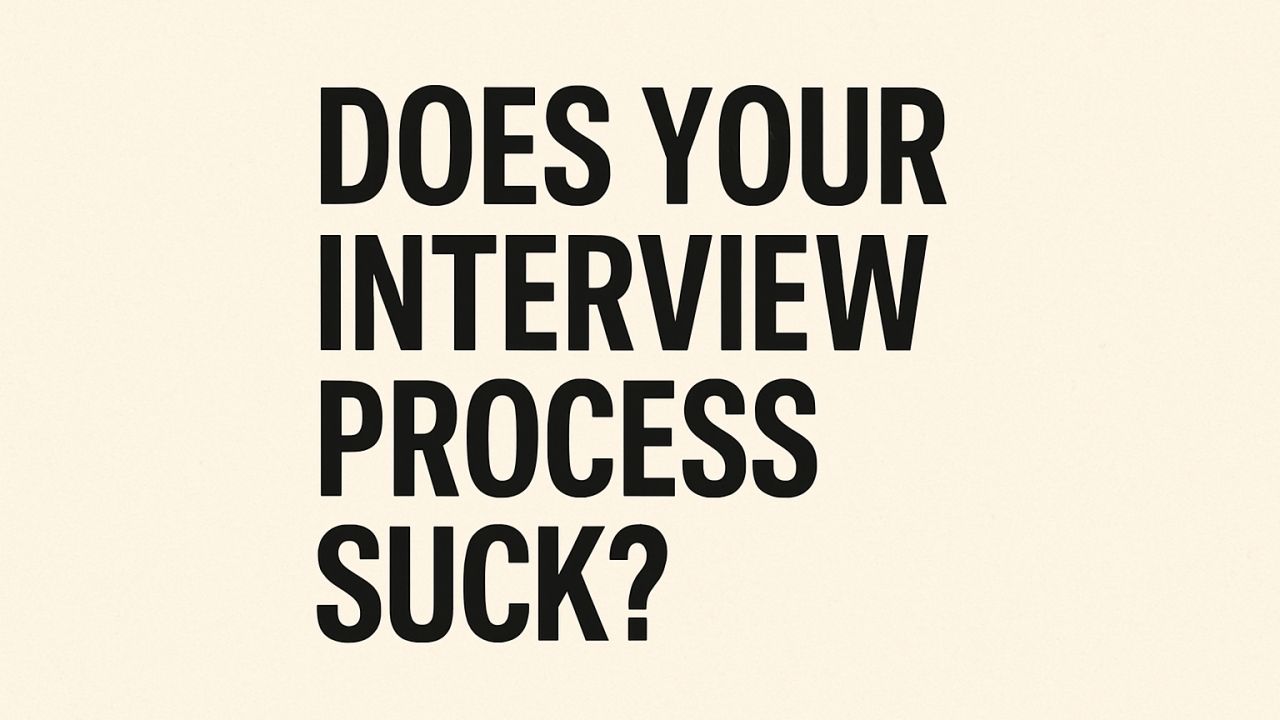Does Your Interview Process Suck?

You’ve got a great company, solid benefits, and maybe even a ping-pong table. But your interview process? It might be chasing away the very people you’re hoping to hire.
I’ve worked with hundreds of companies to help them hire top-tier talent—and I’ve seen it time and time again: broken or bloated hiring processes that send the wrong message and kill momentum before the offer is ever made.
That might sound harsh, but it’s the truth. And if you’re serious about hiring someone who’s going to contribute meaningfully to your team and stay for the long haul, you need to treat the interview process like the high-stakes interaction it is. Because here’s the secret: your interview process says more about your company than your careers page ever will.
Candidates notice. And they remember.
“I had six interviews and still don’t know what they’re looking for.”
That’s a real quote. One of many I hear from talented people who walk away from great companies because of how they were treated during the process. Here’s the truth: Your interview process says more about your company than your careers page ever could. Every step of the process—every email, every delay, every question—tells candidates how you operate. And the best ones? They’re paying attention.
6 Things to Be Aware of
1. You’re Being Interviewed Too
Candidates aren’t just trying to get the job. They’re trying to decide if you’re worth committing their time, energy, and talent to. If your process is chaotic, disorganized, or cold—they’ll assume that’s your culture. Every conversation, every follow-up (or lack of one), and every scheduling hiccup tells them something about your culture.
Why it matters for your company:
Great candidates have options. If your process feels chaotic, dismissive, or unclear, the best ones will self-select out—quietly. You’ll never even know what you lost.
2. Candidates Hate When Interviews Feel Like Interrogations (or Wastes of Time)
You know what top candidates dread?
When interviewers just run through a list of generic questions or haven’t even read the resume, it feels transactional—not meaningful. Include endless rounds of interviews that repeat the same questions, vague job descriptions, or zero feedback. The moment a process starts to feel like a black hole or a bureaucratic checklist, candidates start mentally checking out.
Why it matters for your company:
Great people don’t want to feel like a number. If your process isn’t thoughtful, you won’t attract thoughtful people. A poor experience damages your brand and makes it harder to attract talent. Word spreads. Especially in niche industries or local markets, your reputation precedes you.
3. Reflect the Reality of the Role
The goal isn’t to stump candidates—it’s to understand how they’d actually show up in the role. Are your questions rooted in what success really looks like at your company? Are you evaluating the right things—or just defaulting to generic behavioral prompts?
Why it matters for your company:
Misaligned hiring leads to mis-hires. Mis-hires are expensive. The more aligned the process is with the real job, the better the outcome—for both sides. A strong process sets expectations early, which means better alignment, less turnover, and faster onboarding.
4. It Drags On Forever
If you can’t make a decision after three, four, at most five rounds… you probably don’t know what you’re looking for.
Why it matters for your company:
Every extra round increases the risk of losing the candidate. Momentum matters in hiring.
5. The Way You Treat Candidates is the Way People Assume You Treat Employees
If your interview process is disorganized, opaque, or dismissive, people will assume your internal culture is too. Conversely, if you treat candidates with professionalism, clarity, and respect, it sends a strong signal about how you operate internally.
Why it matters for your company:
This is where employer brand becomes real. Not in your marketing materials—but in the stories candidates tell after the interview, whether they get the job or not.
6. You Ghost—or Go Silent
This one should be obvious. But it still happens. A lot.
Why it matters:
It damages your reputation. Candidates talk, and your employer brand takes the hit—even if the rest of your company is world-class.
Final Thought: If Your Interview Process Were a Candidate—Would You Hire It?
If not, it’s time to take a hard look at what it’s saying to the people you want most. Because at the end of the day, hiring isn’t just about checking boxes. It’s about building trust, showing who you are, and earning the right to bring someone incredible onto your team. The companies that win top talent in this market… They don’t just have great jobs… They have great processes that earn the right to bring those people in.